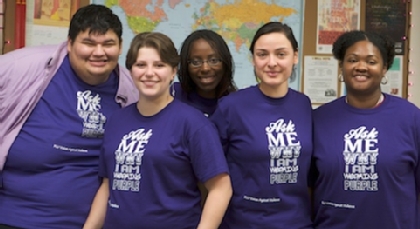Page 206 • (3,317 results in 0.031 seconds)
-

specifically to the Voices Against Violence and Men Against Violence projects, Hughes said. The visit comes as the Women’s Center celebrates its 20th anniversary this month. The center will celebrate the event on March 22. “I’ve very proud that we’ve worked to provide a safer campus environment and one more equipped to deal with sexual violence and stalking,” she said. The Women’s Center received its first Justice Department grant in 2005 of $200,000, which was followed up by another grant in 2007 of
-
March 1, 2011 I never thought I’d be designing for a graphics firm in London Last spring, when Courtney Walker ’11 arrived for her internship at the London-based design firm Abstract Associates, she was fully prepared to be the office go-fer. “I thought I’d be doing coffee and tea runs for people,” Walker said. She never imagined she’d be asked to design work for actual projects – like magazine spreads or invitations to high society events. “I was actually surprised I got to design for them
-

students,” said WHEFA Board Secretary Tom Johnson. Since 1983, the Washington Higher Education Facilities Authority has helped the state’s private, nonprofit colleges access more than $2.5 billion in tax-exempt financing for projects such as student housing, academic and administrative buildings, sports and music facilities, and computer systems. WHEFA’s ability to obtain lower interest rates through the sale of tax-exempt bonds has saved Authority borrowers millions of dollars—a savings ultimately
-

Holocaust Distortion and Denial. Events will include presentations by two of the most prominent Holocaust scholars in the world, Dr. Yehuda Bauer and Dr. Christopher Browning. The conference will close with a panel featuring research projects by student recipients of the Kurt Mayer Summer Scholarship. The annual Powell-Heller Conference for Holocaust Education provides educators, students, and community members a way to use the lessons of the Holocaust to empower themselves and others to challenge
-

theories, research, and policies related to the study of K-12 educational leadership: ethics and social justice, inquiry, policy, and leadership development. The program also includes two job-embedded applied projects focused on program evaluation and instructional leadership and equity impacts in P-12 schools and districts.The Ed.D program at PLU adopts a cohort model with a blended, low-residency program design. Courses will be delivered online and will require on-campus attendance once a month on
-
form. The feedback form can be submitted anonymously if you prefer. Become a RepresentativeRepresentatives’ commitment to PLUSC is crucial to our success. Our expectation is that representatives will spend one hour each month attending the general PLUSC meeting, and an additional hour communicating with constituents or meeting with other members about PLUSC projects. Committee roles will require some additional time, but representatives have the option to select a role which will fit best with
-
, to name a few – appeared there not only due to the excellence of his writing, but also because of his willingness to go where and do what few others would. It took more than just adventurousness; it also took innovation, creativity, and commitment. When the need for a professional photographer for his nature writing became apparent, he became a professional level photographer himself. His fluency in Spanish tells a similar story; some of his projects could not get off the ground without it, so he
-
) that laws instituted over the course of the seventeenth century, for instance, increasingly limited women’s right to own property. Dupin’s research assistant and secretary for this project, the young Jean-Jacques Rousseau, would go on to borrow her ideas, without attributing them to her, in his Discourse on the Origin and Foundation of Inequality Among Men. For their letterpress projects, students chose 17 words to put into print: “Que les f[emmes] sont inférieures aux h[ommes] ….est plus
-
students to: examine their values and ethical responsibilities; appreciate the diversity of human experience; acquire the theories, facts, methods, and statistical tools that define the core of our discipline; apply their knowledge in a range of settings (e.g., the workplace, community, or clinic); learn experientially through internships, research practica, and teaching apprenticeships; and communicate their understanding through their capstone projects and participation in the biannual Department of
-
granted creative control. “Usually Kathy picks the designs and fabrics, but I have undertaken projects where there were no designs or fabrics,” Schultz said. This really comes down to the scale of the production. Costumes for ‘Macbeth’ hang ready for rehearsals … and then the real performances. For Macbeth, Anderson has optioned dark tones. “There’s lots of blood, lots of killing, but there needs to be some light moments as well,” she says, smiling. “She’s really come alive in this new space,” Schultz
Do you have any feedback for us? If so, feel free to use our Feedback Form.


